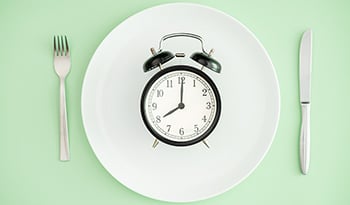Ultimate Beginner’s Guide To Intermittent Fasting

It wasn’t that long ago that the prevailing dietary recommendation for optimal health and weight loss was to eat three (and up to six) meals a day plus snacks. Fast forward 10 years to today you will find those recommendations are quickly shifting. There is an excellent reason for this. We have had an enormous influx of quality research showing that simply skipping a meal can put the body in a fat-burning mode and optimize one’s health as well.
For the vast majority of Americans, however, the notion of intentionally skipping a meal may dredge up a sense of panic, as most individuals are conditioned and were advised to eat three meals daily in addition to snacking. Before three meals a day became commonplace, human history shows fasting was the norm, as we didn’t have 24/7 access to food as we do now. Our ancestors had to hunt for their meals. This meant less regular eating or even days without food if they could not find any. This is our genetic legacy.
When you eat throughout the day and never skip a meal, your body can adapt by burning sugar (glucose) as its primary fuel, which stops enzymes that utilize and burn stored fat. As a result, you become a sugar burner as opposed to a fat burner. You may become progressively more insulin-resistant, gain weight and can struggle to lose weight.
Enter intermittent fasting.
What is Intermittent Fasting?
Intermittent fasting is a technique to flip the metabolic switch by simply eating less frequently, but not less. When you intentionally limit your eating window and eat nutrient-dense foods, you give your body time to digest, repair cells, create beneficial hormone levels and avoid energy-stealing blood sugar crashes that can lead to fatigue, snacking and weight gain. While there are many natural solutions to address health conditions, intermittent fasting is highly effective and cost-effective.
Fasting is also beneficial because it can generate energy sources in the body called ketones, which promote longevity, improve glucose metabolism, reduce inflammation, remove cellular debris and senescent cells (old dying cells), increase autophagy (cellular detox, also increased by black-coffee consumption) and aid mitochondrial health. A multitude of other benefits to be had from skipping meals include increased insulin sensitivity, fat loss—including belly fat, improved cholesterol profiles, increased growth hormone (HGH) production, and improved gut health.
Intermittent Fasting Methods
There are many different intermittent fasting methods. The main variable is, of course, the amount of time between meals. Here are five examples.
12-Hour Method
This is a very popular method and excellent for beginners, as most of the fasting is done while sleeping. An example would be to have your last meal at 7 p.m. and your next meal at 7 a.m., a sufficiently long period to derive benefits from fasting.
16/8 Method
This is the most common form along with the 12-hour method. On this fast, you usually finish your evening meal by 8 p.m. and then skip breakfast the next day, not eating again until noon.
5:2 Method
Using this method you consume only 500–600 calories on two non-consecutive days of the week, but eat normally the other 5 days.
One Meal A Day Method
This method has you fasting for 23 hours straight and then consuming one large meal in an hour-long window.
Alternate Day Fasting Method
You fast every other day.
Potential Side Effects
Hunger
The “hunger hormone,” ghrelin, creates a metabolic rhythm that leads your body to expect to be fed at regular times. So, until your body adjusts to a new circadian rhythm caused by new meal times, hunger might be an issue. Occasionally you will feel your stomach growling, particularly in the beginning. You will not starve. Have you ever had to fast for a blood test? You survived. Mindset is key. Distract yourself and know that the hunger pangs last only a few minutes. If the hunger feeling becomes too much for you, eat. Otherwise, have water, tea or black coffee.
Fatigue and Brain Fog
When your body has been dependent on continual glucose sources for fuel (particularly carb intake, sweets, and sugar, from meals as well as snacking), there must be an adjustment period before it begins to rely on fat. During this period, you may feel tired and have brain fog—both completely normal. Keeping hydrated and sleeping well can help reduce these symptoms.
Nutrient Deficiencies
You may inadvertently create nutrient deficiencies if you are not mindful about choosing foods high in nutrients. However, when fasting, if your diet is deficient in a particular nutrient, already deficient prior to fasting or deficient in the assimilation of nutrients, you can put your health at risk. Supporting your body with the right nutrients will not only protect you but also optimize health along the way.
Overeating
Many feel as if they are overeating when breaking their fast, when, in fact, research shows they tend to be eating less. This is why intermittent fasting is a game-changer when it comes to weight loss. However, some people do still struggle with overeating after their fasts, but this will fade away. Being mindful of what you are eating and only keeping healthy, nutrient-dense foods in your environment is key. Ensure you eat enough the day before you fast.
Headaches
The main cause of headaches is dehydration, so it is crucial to drink enough water. Additionally, a lack of sleep or low blood sugar can trigger headaches when fasting. And because intermittent fasting is a stressor on the body, stress hormones might generate a headache as well.
Simple lifestyle adjustments such as drinking more water, getting enough sleep, taking supplements and eating enough the day before you fast can help prevent headaches when fasting.
Hormonal Imbalance
Keep in mind that in some people, particularly women, intermittent fasting can exacerbate hormonal imbalance issues or even potentially create them, particularly if you are stressed. Always check with your doctor before undertaking a fast. Those with adrenal fatigue should proceed cautiously, since skipping meals can stress the body.
Supplements to Optimize Health While Fasting
Another potential side effect of fasting is not satisfying your body’s nutrient requirements, so supplementing can be useful. Below are some of the essential nutrients you may need to add to your regimen.
Remember to take supplements after your first meal (or after both meals) when fasting since taking supplements will otherwise break your fast. Also, monitor your coffee and tea intake when supplementing because tannins and caffeine can lower your body’s absorption rate of the supplements.
Multivitamins
It is vital to have a basic multivitamin to create a nutritional foundation. Think of a multivitamin as nutritional insurance to fill any gaps created with the fasting process.
Vitamin D3
Even most healthful diets do not contain enough vitamin D3, which is essential for optimal health, and the majority of people end up deficient in this vitamin. While fasting, a satisfactory store of vitamin D assists in optimal fat loss, particularly belly fat.
Omega 3 Fats
Omega-3 fat is crucial to optimal health, as it tamps down inflammation. Most diets include a high intake of omega-6 fat, which leaves us inflamed, fat and sick. Omega-3 to the rescue! Particularly when fasting, you will want to ensure you are adding omega-3 to reduce low-level inflammation.
Vitamin B Complex
Many people are chronically deficient in B vitamins and particularly, B-12. B vitamins have a direct impact on your energy levels, brain function and cell metabolism.
Taking a B-complex supplement regularly can help ensure proper absorption of magnesium and potassium—important for those who are fasting.
Minerals
Magnesium, potassium and sodium are crucial for fasting and also with the ketogenic diet. To prevent muscle cramps, fatigue or headaches, add magnesium and potassium supplements to your fasting routine.
Intermittent fasting is an excellent dieting tool with enormous potential benefits, but it is not for everyone. For example, people with diabetes, pregnant or nursing mothers and children should not practice intermittent fasting. And if you are managing a chronic illness, you should check with your doctor first. Additionally, if you have a history of disordered eating, intermittent fasting should be avoided.
DISCLAIMER:This Wellness Hub does not intend to provide diagnosis...















































































 Table of Contents
Table of Contents
















